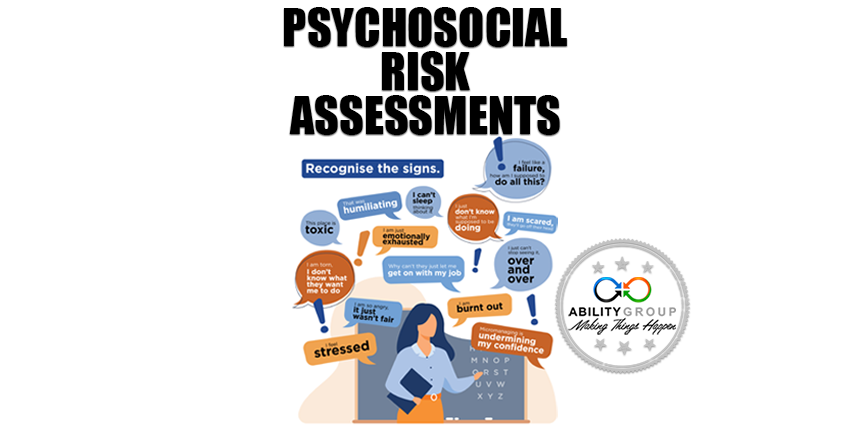In 2025, psychological safety is no longer a secondary concern, having become a core workplace obligation. With updated WHS legislation now requiring Australian employers to manage psychosocial hazards with the same rigour as physical risks, psychosocial risk assessments have become essential. At ABILITY GROUP, we help organisations move beyond compliance to build workplaces that are safe, supportive, and strategically resilient.
What Is a Psychosocial Risk Assessment?
A psychosocial risk assessment is a structured process for identifying, evaluating, and controlling workplace factors that could harm mental health or wellbeing. These include:
- High job demands or low control
- Poor role clarity or organisational change
- Bullying, harassment, or interpersonal conflict
- Isolation, remote work, or lack of support
- Exposure to traumatic events or unsafe environments
Under SafeWork Australia’s model Code of Practice, these risks must be assessed and managed using the same four-step WHS framework applied to physical hazards.
Why They Matter in 2025
Recent reforms in NSW and Victoria have elevated psychosocial risk management to a legal requirement. Employers must now:
- Identify psychosocial hazards
- Assess the likelihood and severity of harm
- Implement control measures
- Review and consult regularly
Failure to do so can result in regulatory action, increased workers’ compensation claims, and also (business/organisational) reputational damage.
In Victoria, new regulations commencing in December 2025 will require formal prevention plans and updated compliance codes for psychological health.
Suggested Approach
We support businesses with a tailored, evidence-based process and national WHS standards:
1. Workplace Audit & Hazard Identification
Review job design, leadership, culture, and environmental factors to uncover hidden psychosocial risks
2. Risk Assessment & Prioritisation
Evaluate the likelihood and impact of each hazard, helping you focus on what matters most
3. Control Planning & Implementation
Develop practical, scalable interventions, from workload redesign to peer support programs
4. Policy Integration & Documentation
Update your WHS policies, risk registers, and reporting tools to reflect 2025 compliance standards
5. Training & Engagement
Equip managers and teams with the skills to recognise, report, and respond to psychosocial risks—building a culture of care and accountability
Turning Compliance into Culture
Psychosocial risk assessments are no longer optional; they are a legal obligation and strategic necessity. As psychological injury claims rise and WHS reforms take hold, businesses should act now to protect their people and business.
ABILITY GROUP can help you:
- Meet your legal obligations
- Reduce risks of psychological harm
- Reduce workers’ compensation exposure
- Build a safer, more resilient workplace
Need help?
Contact our team to discuss.
Further Information
Source: safework Australia
Title: Identifying, assessing, controlling and reviewing
Read Time: 5+ minutes

